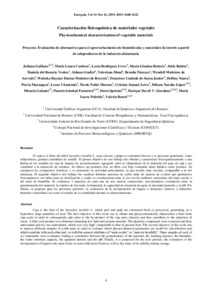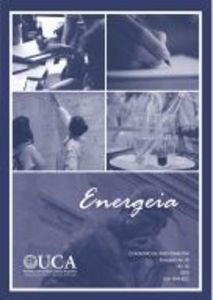Por favor, use este identificador para citar o enlazar este ítem:
https://repositorio.uca.edu.ar/handle/123456789/9851| Título: | Caracterización fisicoquímica de materiales vegetales Physicochemical characterization of vegetable materials |
Autor: | Galliano, Juliana Cardozo, María Laura Rodriguez Livov, Lucía Bottero, María Gianina Baldor, Sofía Venica, Daniela del Rosario Giudici, Aldana Diani, Valeriana Paruzzo, Brenda Medeiros de Azevedo, Wendell Medeiros de Bezerra, Waleska Rayane Dantas Caninde de Sousa Junior, Francisco Nuara, Delfina Marangon, Flavia Vitantonio, Lucas Moreno, Nicole Nahir Leiva, Cristian Imanol López, Débora Natalia Galante, Micaela Forastieri, Pamela Soledad Spelzini, Darío Giordano, Enrique David V. Pedrido, María Laura Boeris, Valeria |
Palabras clave: | YERBA MATE; HARINAS; SEMILLAS; INDUSTRIA ALIMENTARIA | Fecha de publicación: | 2019 | Editorial: | Pontificia Universidad Católica Argentina. Facultad de Química e Ingeniería "Fray Rogelio Bacon". Departamento de Investigación Institucional | Cita: | Galliano, J., et al. Caracterización fisicoquímica de materiales vegetales [en línea]. Energeia. 2019, 16(16). Disponible en: https://repositorio.uca.edu.ar/handle/123456789/9851 | Proyecto: | Evaluación de alternativas para el aprovechamiento de biomoléculas y materiales de interés a partir de subproductos de la industria alimentaria | Resumen: | Resumen: El cajá es el fruto del árbol Spondias mombin L. cuya cáscara y pulpa se consumen frescas o se procesan generando, como subproducto, grandes cantidades de semilla. El primer objetivo de este trabajo fue obtener y caracterizar fisicoquímicamente a una harina de las semillas de cajá de manera de, posteriormente, agregarle valor al subproducto de la industria del jugo de cajá y así contribuir a la reducción de residuos. Se obtuvo un producto rico en fibra, con bajo contenido tanto lipídico como proteico. Se extrajeron los compuestos fenólicos y se determinó su actividad antioxidante, la que resultó muy elevada, comparable a la del maracujá. El segundo objetivo del trabajo fue analizar distintas muestras de yerba mate de manera de evaluar qué parámetros fisicoquímicos son útiles para su clasificación y cuáles se correlacionan entre sí y/o con los atributos sensoriales del mate cocido o del mate de bombilla. Se evaluaron 3 muestras de cada una de seis marcas comerciales, encontrandose correlación entre la granulometría del material, la cinética de lixiviado, la humedad, la capacidad de retención de agua, la densidad aparente y el pH. Por último, se propone para los próximos períodos, la evaluación de la incorporación de bagazo a alimentos cárnicos o alimentos húmedos semisólidos así como el estudio de su estabilidad durante su almacenamiento. Abstract: Caja is the fruit of the Spondias mombin L. which peel and pulp are consumed fresh or processed, generating, as a byproduct, large quantities of seed. The first objective of this work was to obtain and physicochemically characterize a flour from caja seeds in order to subsequently add value to the by-product of the caja juice industry and thus contribute to the reduction of waste. A fiber-rich product was obtained containing low lipid and protein amounts. The phenolic compounds were extracted and their antioxidant activity was determined, which was very high, comparable to that of passion fruit. The second objective of the work was to analyze different samples of yerba mate in order to evaluate which physicochemical parameters are useful for classification and which correlate with each other and / or with the sensory attributes of “mate cocido” or “mate de bombilla”. Three samples of each of six trademarks were evaluated, finding a correlation between the granulometry of the material, the leaching kinetics, the humidity, the water retention capacity, the apparent density and the pH. Finally, it is proposed for the next periods, the evaluation of the incorporation of bagasse into meat foods or semi-solid moist foods as well as the study of its stability during storage. |
URI: | https://repositorio.uca.edu.ar/handle/123456789/9851 | ISSN: | 1668-1622 | Disciplina: | INGENIERIA EN ALIMENTOS | Derechos: | Acceso abierto | Fuente: | Energeia. 2019, 16(16) |
| Aparece en las colecciones: | ENE 2019 Año 16 nro. 16 |
Ficheros en este ítem:
| Fichero | Descripción | Tamaño | Formato | |
|---|---|---|---|---|
| caracterizacion-fisicoquimica-materiales-vegetales.pdf | 437,56 kB | Adobe PDF |  Visualizar/Abrir | |
| energeia16.jpg | 6,79 kB | JPEG |  Visualizar/Abrir |
Visualizaciones de página(s)
367
comprobado en 30-abr-2024
Descarga(s)
667
comprobado en 30-abr-2024
Google ScholarTM
Ver en Google Scholar
Este ítem está sujeto a una Licencia Creative Commons

